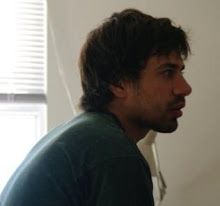I can not think of a better illustration of how our knowledge affects the way we perceive reality than the Allegory of the Cave , in where some prisoners who have lived all their lives in a cave facing a wall, can see the shadows of men passing by behind them, some talking, while others silent; logically, if the prisoners are not able to turn their necks around, there is no reason to believe that they would not consider that the figures in the wall are the ones talking; and if one of those prisoners is ever released and sent to the outside, he would first experience irritation and pain due to the fact that he had never been exposed to the sunlight before; the glare will distress him, and he will be unable to see the realities of which in his former state he had seen the shadows; he then would realize that what he saw before was an illusion, but that now, when he is approaching nearer to being and his eye is turned towards more real existence, he has a clearer vision. And if this person is ever dragged into the cave again, then he will frequently be misunderstood by those ordinary prisoners back in the cave who hadn't shared in the intellectual insight. In this allegory, the prison-house is the world of sight, the light of the fire is the sun, and the journey upwards would be the ascent of the soul into the intellectual world [1]. Our ignorance is the cave that constrains us, frustrating and misleading our understanding of reality and the world in which we are submerged. This journey out of the cave will probably be difficult, perhaps even painful, as sometimes is the understanding of new knowledge, of a different system of thought, or the inevitable resistance to adaptation and acceptance of a new paradigm that goes against our established knowledge in some certain field. As the famous naturalist Charles Darwin once wrote, “Although I am fully convinced of the truth of the views given in this volume… I by no means expect to convince experienced naturalists whose minds are stocked with a multitude of facts all viewed, during along course of years, from a point of view directly opposite to mine… but I look with confidence to the future, to young and rising naturalists, who will be able to view both sides of the question with impartiality.”[2] Max Planck in his autobiography made a similar point, “a new scientific truth does not triumph by convincing its opponents and making them see the light, but rather because its opponents eventually die, and a new generation grows up that is familiar with it.”[3] Through the course of our lives new ideas will emerge, and even the most radical and extremist ones should be considered in order to maintain a balance in our perception of the world. A well rounded education and always having an open mind and a good predisposition to learning will prepare us not to prejudge new ideas, and not to be brainwashed by, especially (though indirectly), multinational corporations, as we are inevitably subjected to their game and interests. Even governments, formed by those who represent us, and the media which is supposedly objective and independent, are subjected to their influence, and most of the times will be influenced, bought, and/or conditioned. It would be a real accomplishment if we could achieve the necessary independence of thought so as to not have the attitude that normal science sometimes has, which according to Thomas Khun “…often suppresses fundamental novelties because they are necessarily subversive of its basic commitments.”[4] I do not want to be read as a naïve and idealistic young man; even though I do have ideals, rational and down-to-earth goals, perhaps being some highly ambitious such as someday in the future creating my own company specialized in the production energy using alternative means, it is by instructing ourselves that we will be able to not let others influence our reasoning nor interfere on our goals, have our own formed opinions, and by being aware of the different breakthroughs and technological advances we will be able to look at the future and make informed and educated predictions/decisions. It is our acquired education that will determine the capacity of abstraction and objectivity in perceiving the most precise approximation to reality, and this education will be reflected in the quality of our opinions. 
Illustration from Great Dialogues of Plato: Complete texts of The Republic, Apology, Crito Phaido, Ion, and Meno. Vol. 1 (Warmington and Rouse, eds.) New York, Signet Classics 1999 p. 316
[1] Plato - The Republic
[2] Darwin - On the Origin of Species
[3] Max Planck – Scientific Autobiography and Other Papers
[4] Thomas Kuhn - The Structure of Scientific Revolutions p. 5
Friday, August 04, 2006
Personal Thoughts II - Education and Perception of Reality
Posted by
schamton
at
Friday, August 04, 2006
![]()
Subscribe to:
Post Comments (Atom)

2 comments:
Peut être je dois le lire plusieurs foi pour comprendre.. ou non? je ne sais pas, c'est l'heure qui m'affecte, lol! Mais je te met un A+++ qui va jusqu'à l'infinit! d'accord? muajajaja je veux une camera maintenant!! sa me fait du mal, comme même demain peut être j'irais voir jeans pour jeter de l'argent. jajaja
Et toi tu te crois "condorito"??, tu pense que ma soeur ne lis pas mon flog?! Elle va me cogné parce que je te raconte tout! jajaja J'écris trop..
Tu sais, ma maman n'arrive pas encore, je voudrai l'attendre, mais le sommeil me dis que je doit partir faire dodo :) bonne nuit! Je t'appelle demain.
that cave drawing kinda reminds me of the ARC...where I'm stuck like 80 hours a week
Post a Comment